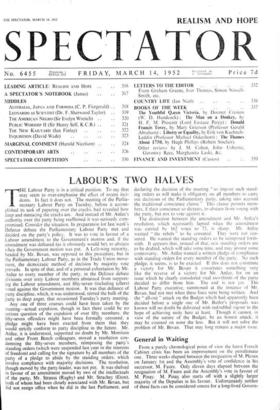LABOUR'S TWO HALVES
Any one of three courses could have been taken by the meeting—actual expulsion, though in fact there could be no serious question of the expulsion of over fifty members; the fifty-seven offenders might have been formally censured; a pledge might have been exacted from them that they would strictly conform to party discipline in the future. Mr. Attlee, it is understood, supported no doubt by Mr. Morrison and other Front Bench colleagues, moved a resolution con- demning the fifty-seven members, reimposing the party's standing orders (which were suspended last year in the interests of freedom) and calling for the signature by all members of the party of a pledge to abide by the standing orders, which involve compliance with majority decisions. The resolution, though moved by the party-leader, was not put. It was shelved in favour of an amendment moved by two of the intellectuals of the party, Mr. Strauss (Rugby) and Mr. Strachey (Eton), both of whom had been closely associated with Mr. Bevan, but did not resign office when he did in the last Parliament, and
declaring the decision of the meeting " to impose such stand- ing orders as will make it obligatory on all members to carry out decisions of the Parliamentary party, taking into account the traditional conscience clause." This clause permits mem- bers, if their conscience so dictates, to abstain from voting with the party. but not to vote against it.
The distinction between the amendment and Mr. Attlee's resolution. which necessarily lapsed when the amendment was carried by 162 votes to 73, is sharp. Mr. Attlee wanted " the rebels " to be censured. They were not cen- sured. He wanted the standing orders, to be reimposed forth- with. It appears that, instead of that, new standing orders are to be drafted, which will take some time. and may arouse some controversy. Mr. Attlee wanted a written pledge of compliance with standing orders for every member of the party. No such pledge, it seems, is to be exacted. if this does not constitute a victory for Mr. Bevan it constitutes something very like the reverse of a victory for Mr. Attlee, for on an issue which he clearly considered vital two-thirds of the party decided to differ from him. The end is not yet. The Labour Party executive, summoned at the instance of Mr. Bevan, had not met when these lines were being written. And the " all-out " attack on the Budget which had apparently been decided before a single one of Mr. Butler's proposals was known will no doubt be delivered with redoubled vigour in the hope of achieving unity here at least. Though it cannot, in view of the nature of the Budget, be an honest attack, it may be counted on none the less. But it will not solve the problem of Mr. Bevan. That may long remain a major issue.










































